Buying a car is an exciting moment, but selling a car can be a headache.
While most of us just want to get the car sold fast, we also want to get the best price possible.
And with 85 per cent of motorists willing to accept a low offer just to get the process over with, rushing to make that sale unequipped could leave you with 50 per cent less cash in your pocket.
A survey by independent used car retailer Motorpoint of over 2,000 UK car owners who sold or changed their motor in the last five years has highlighted a key set of things to avoid before selling which could impact the sale or reduce the price you get.
With new ’24’ plates on sale since the 1 March, many car owners are wanting to trade their old wheels in for new ones.
So, here are the top nine things Motorpoint’s experts want you to look for to save money, and time:
1. Two sets of keys
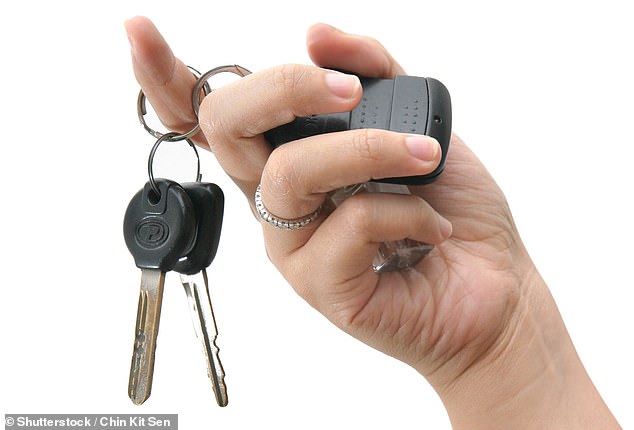
Car key replacement is around £240 but modern keys with keyless lock and go can cost more than £1000 but trying to sell your car without the spare key can cut 5 to 10 per cent off the price
It might seem like a small issue, only having one key. After all isn’t a key only a couple of hundred quid to replace?
But John Hood, Motorpoint’s general manager of trade acquisition, claims that not having both sets, and not having the original key in particular can make your car much less desirable and, in some cases, impossible to sell.
‘The average cost to replace a key is around £240, but a new remote or keyless entry key for a modern vehicle could cost you more than £1,000.
‘However, without both sets of keys, expect to see anywhere between 5 to 10 per cent less for your vehicle’, he says.
According to data from Motorpoint’s Sell Your Car service, motorists without both sets of keys could be missing out on as much as £1,530 when it comes to selling their car.
2. Having 100k miles on the clock could knock off £3k
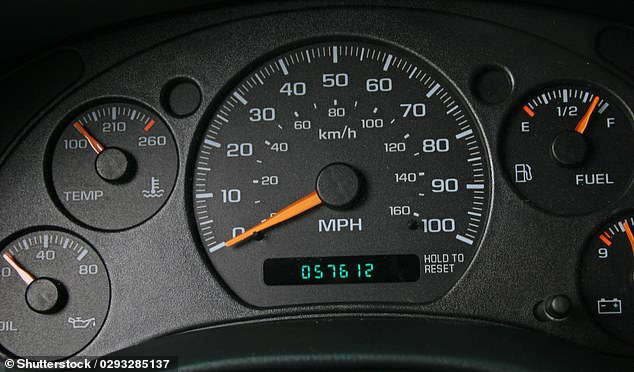
60,000 miles on the clock is the sweet spot before your wheels lose 27 per cent value – but make sure you sell before 100,000 miles in particular
Recent data from Carwow found that the sweet spot to sell your car is before it reaches 60,000 miles.
On average cars lose around 27 per cent of their value when the odometer reaches 60,000.
Motorpoint adds that, while it is a misconception that over 100,000 miles makes a car less reliable, it does mean your wheels can drop 20 per cent in value because of this view.
Hood recommends ‘motorists sell their vehicles before they reach this mark because simply put, the lower the mileage, the higher price you’ll get for your car.’
3. Removing modifications could increase value by £6k
It’s worth remembering that customising your car to your own specific tastes is great while you’re driving it, but it might make it harder to sell on.
Before modifying a vehicle Hood advises keeping retail impact in mind: ‘Performance enhancements such as swapping out exhausts, rather than adding value, can lead to reduced sale prices, sometimes by as much as 40 per cent – meaning you’ve not only spent money modifying your vehicle, but you’ll also be missing out when it comes to selling.
‘In extreme cases, motorists with modified cars could lose out on somewhere near £6,120 in resale value.’
4.Keep your car as clean as possible
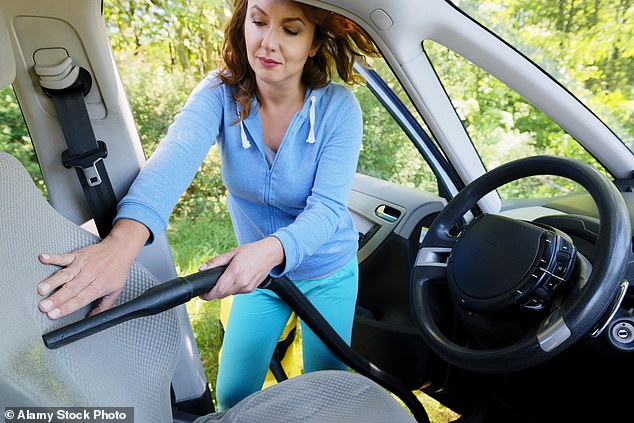
Getting a professional valet before you sell your car can help improve first impressions but keeping your car clean regularly has the biggest impact on value retention
A poorly kept car could knock over £1,500 off its value, so keeping it clean and well-maintained really is worth it.
Smoking or having pets in your car regularly could impact the price by 10 per cent, according to Motorpoint.
First impressions count so it’s worth getting a professional valet done, but if you think you can make your car sparkle inside and out then you can also save yourself around £150 by doing your own valet.
5. Sort warning lights or miss out on up to £4,590
Warning lights can knock up to 30 per cent off the value of your car when looking to sell.
Don’t be tempted to pass on repair costs during the sale because you’re likely going to be losing more money than you would have to fork out for repairs.
‘While it’s dependent on the value of your vehicle, the average motorist could expect to see as much as £4,500 knocked off the value of your car.
‘In many cases, it really is cheaper to get the issue fixed before selling’, Hood recommends.
6. Private plates don’t increase the value of your car
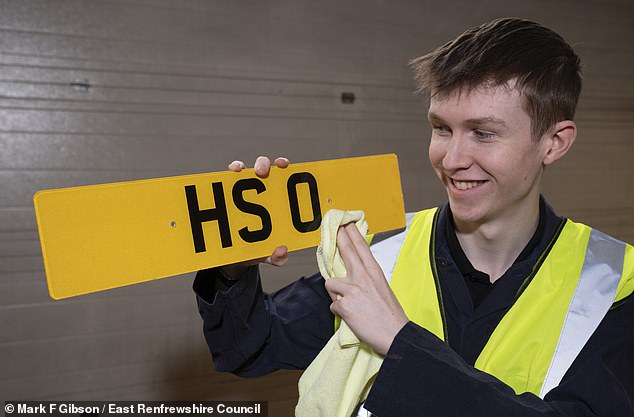
Private plates can make a fortune when sold separately to your car, but actually reduce the value of your motor if you sell them with the car as a private plate is seen as a modification
Private plates are hot commodities with some of the most expensive DVLA plates going for hundreds of thousands of pounds.
While private plates can look cool they are classed as a personal modification to a vehicle.
Any modification wise can impact the price of the car and a private plate could knock off between £200 and £300.
John says: ‘You probably want to keep your private number plate when you sell up, but if for any reason you don’t want it anymore, it’s probably best to sell it separately than with the vehicle.
‘Not only are you likely to get a good price for them, but a personalised plate won’t make the value of your car higher. In many cases, you’ll be charged for the inconvenience and time it would take to return the car to the age-related plates.’
7. Tread depth matters, and could cost you
Tyre checks are critical for safety and to make sure you aren’t breaking the law while driving.
Whether you use a tyre tread depth or the 20p coin check, your car tyres should always meet legal requirements.
Monthly tyre checks should be part of your car maintenance routine.
But when you sell your car on, do a final check of the tyres to make absolutely certain that they meet legal tread depth requirements.
Same as with repairs, dealerships will charge you for time and inconveniencing changing your tyres, so check your tyres before you hand over the keys.
8. Each scratch or scuff deducts £50 off your valuation
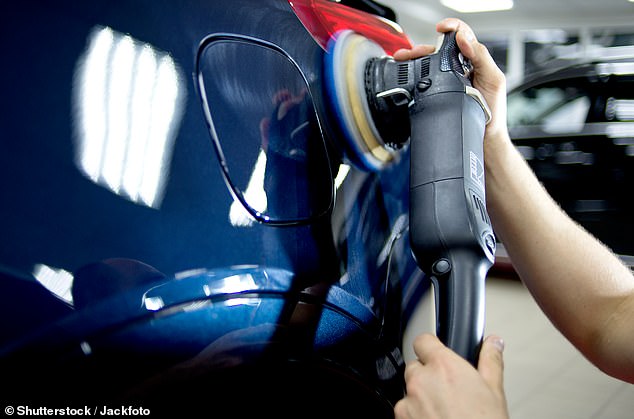
Each scratch or scuff could knock £50 off the price of your car so make sure you get small repair costs covered before you sell
Even minor chips can impact your car’s value. Address any damages to your car before selling to make sure you take home the full value of the car.
According to the experts, motorists could see as much as £50 per scratch knocked off an initial valuation if their car doesn’t meet the condition you stated, so it’s worth getting these checked out.
Most of the time your car insurance policy will cover these small repair costs anyway so shop around at garages to get some quotes for light body paint touch ups and repairs.
It’s vital to make sure colours and parts are authentic and matching though, or Motorpoint warns or you could have thousands knocked off the offer price.
9. Keep up with service checks to prevent £2k hit
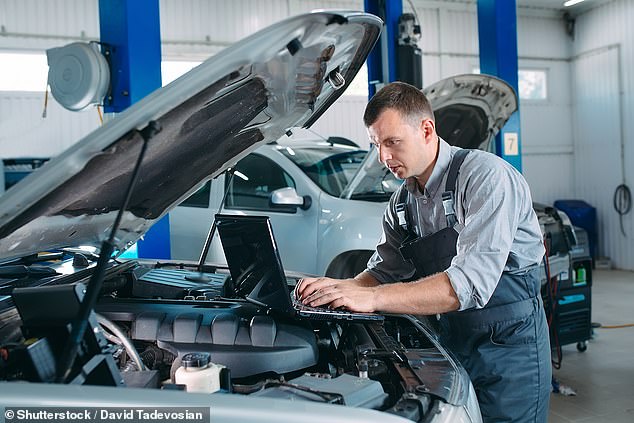
Falling behind on your car servicing can reduce your car’s value by 10 to 15 per cent so mkae sure you book in regularly and keep a record of all the service history too
It might not seem like a big deal at the time, but falling behind on your car’s service schedule can prove to be a costly mistake when selling your car.
An incomplete service history will reduce your car’s value by 10 to 15 per cent – and even more if your car is still within the manufacturer’s warranty period, as this will be void if you haven’t kept up with your services.
Remember you’re entirely entitled to go to independent garages for MOTs and service works. Unlike what many drivers are told or believe, you are not legally required to go to the official dealership.
Some links in this article may be affiliate links. If you click on them we may earn a small commission. That helps us fund This Is Money, and keep it free to use. We do not write articles to promote products. We do not allow any commercial relationship to affect our editorial independence.



